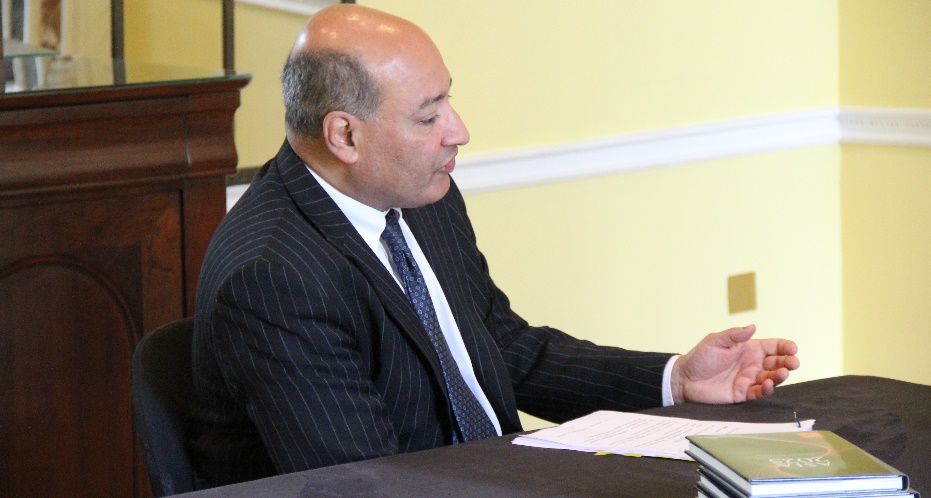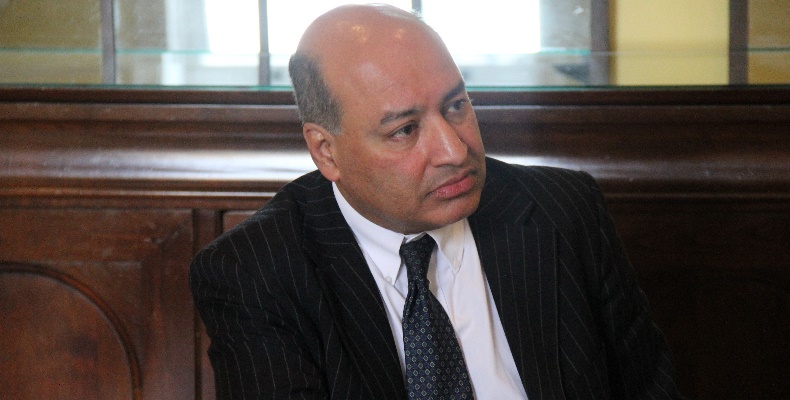Driving commercial and political engagement between Asia, the Middle East and Europe
Driving commercial and political engagement between Asia, the Middle East and Europe
Driving commercial and political engagement between Asia, the Middle East and Europe

The European Bank for Reconstruction and Development (EBRD) is one of the largest investors in the private sector in Central Asia and is financing many projects along the rejuvenated Silk Road. The multilateral development bank is also looking to fund projects that are part of China’s Belt and Road Initiative and is scaling up its links to companies in China and Japan.
China became the bank’s 67th shareholder in mid-January. The bank opened up its first office in Tokyo in February.
In an exclusive interview with Asia House following a briefing to Asia House corporate members about these latest developments, EBRD President Sir Suma Chakrabarti revealed that the bank had invested a record €1.4 billion in Central Asia in 2015, up 75 per cent on the previous year.
Sir Suma explained Turkey and Central Asia are now “growth areas” for the bank. The bank is seeing a push in its investments in the direction of the “South and the East”, he explained, referring also to expansion in North Africa and the Middle East.
“Central Asia is a priority for us, underscored by our first ever FT-EBRD Central Asia Investment Forum that took place in Istanbul in February,” he added.
The EBRD provides financial products and business services to a range of industries, from agribusiness to infrastructure to transport, in more than 30 countries, with a focus on lending to and advising the private sector.
In 2015 the 18th largest economy in the world – Turkey – was the largest recipient of EBRD investment, followed by Ukraine, Egypt and Kazakhstan.
“A lot of the projects in Central Asia are infrastructure and energy projects, including municipal infrastructure,” Sir Suma said.
“In addition to our financial investments we are also continuing to support the reforms that countries like Kazakhstan are putting in place in order to improve the business climate and to diversify their economies,” he added.
Ukraine was the second largest recipient of EBRD funds in 2015, he said. The EBRD is the largest international financial investor in Ukraine. “We have scaled up in Ukraine in response to democratic change and a string of reforms,” he added.
“We shall continue to invest strongly in Central Asia – especially during a time when there are economic problems and some countries are badly affected by the slump in commodities prices. We are scaling up efforts to do more business with Asian banks and companies,” Sir Suma continued.
On the subject of China joining the EBRD in January as a non-recipient country, “That was a win-win-win situation for everyone,” Sir Suma said. “A win for China, a win for EBRD and win for countries in the EBRD region,” he stated, explaining the bank hoped to work with Chinese companies on projects in the regions the EBRD invests in.
“It’s a win for the EBRD itself to have the world’s second largest economy as a member,” he added. “We were the last multilateral development bank for them to join. We are very different to the other multilateral banks as we are more private sector-focused,” he said.
“It’s a win for China too as it gives them access to a private sector focused multilateral bank with deep country and sector knowledge.
“China wants to increase its own investment in EBRD countries. If you look at the characteristics of China’s economy, it is underinvesting in EBRD countries, so if China wants to plug the gap then one fast way to do it is to work with the EBRD to do that. So it means we can work more with Chinese banks and corporates and partner with them on projects in the sectors of infrastructure, energy and finance,” he said.
“It’s a win for the countries we operate in too as many of them want to increase the amount of Chinese investment they get but according to the highest standards. Chinese membership will help them attract more of the foreign direct investment they need,” he said.
More than 80 per cent of EBRD’s financial investments and business services support the private sector, unlike other multilateral development banks that tend to focus on the public sector.
China set up the Asian Infrastructure Investment Bank (AIIB) in 2014 creating what some perceived to be an Asian-centric rival to Western-dominated Bretton Woods Institutions. Japan and the USA, both shareholders in the EBRD, have so far refrained from joining the AIIB.
But Sir Suma said there was no resistance among the EBRD’s existing members, which include Japan and the USA, regarding China joining the EBRD. “It was a unanimous vote,” he said.

President of the EBRD Sir Suma Chakrabarti says that Turkey and Central Asia are “growth areas” for the bank
He then explained: “Membership issues are always political issues and the timing is always very important. It was very evident that the momentum was there after a string of European countries, led by the UK, joined the AIIB last year. There was a sense that it should be reciprocated,” he said.
A variety of European countries are shareholder members of the EBRD, as is the European Union and the European Investment Bank.
China’s shareholding in the EBRD is tiny however, compared to that of other countries and the size of its economy. China has just a 0.1 per cent stake in the bank.
But Sir Suma said the bank has a “mantra” to treat every shareholder the same.
“China is a very important shareholder because of the size of their economy and their political weight in global issues so the shareholding size should not determine how much interest we take in China and the amount of time we are spending on the China has obviously risen greatly since membership. We have a limited fund of shares and not enough to offer as many shares as many of our shareholders including China may want,” he said.
The EBRD is also strengthening its relationship with Japan, a founding shareholder of the EBRD. In February, the EBRD opened its first Representative Office in Tokyo. Japan is an important source of foreign direct investment in the EBRD’s countries of operations.
“I felt that we needed to do much more in terms of getting investment from Japan. We already do a lot of business with Japanese entities. We have made joint investments with Japanese firms worth about €8.15 billion. Given the size of the Japanese economy and their footprint in some of the countries that we operate in, it’s not enough,” Sir Suma said.
“The problem is that we were doing business at a distance and flying in and out of Tokyo is not the most efficient way. It required us to be more on the spot.
“Having a full presence in Tokyo will help us reach out much more proactively to Japanese corporations and banks to invest in our projects. We are already working with Mitsui in Jordan and Mitsubishi in Turkey. However it could be stepped up.”
“We aim to work with Chinese and Japanese firms across all of our regions, but there will of course be a big focus on Central Asia,” he said.
Central Asia will also be where EBRD cooperates closely with the AIIB, he said.
Sir Suma said the bank welcomed the newest player in the market – the AIIB – and they were going to start working together to plug the huge infrastructure gap in Asia.
Approximately half of that money is needed to invest in energy infrastructure, a third for transport, 13 per cent for ICT and three per cent for water and sanitation.
“We have a strong relationship with the AIIB. The minute the AIIB was created we strongly championed it because we think there is a huge infrastructure gap and we realised we could not do it on our own. We are very positive about the AIIB,” he said.
“We were working with AIIB very closely even before its formal launch, in helping to set up the organisation’s central processes and procedures. We explained what worked with us and where we made changes. We advised on valuation, procurement and other aspects of the business. We were the last new kid on the block so we were a natural partner to talk to them,” he said.
He explained the EBRD was now moving towards operational cooperation with the AIIB too and had two projects in mind.
“I am hopeful we are going to be able to co-finance two road infrastructure projects in Central Asia the next nine months. I am confident that we will sign two of them,” he said.
He said he was not at all worried about any governance issues at the AIIB. “We are extremely supportive of their desire to apply the same standards as us,” he added.
Whilst India is not a member of the EBRD, Sir Suma said the bank was working closely with Indian companies in the countries that EBRD works in. “We are allowed to work globally with companies from non-shareholding countries,” he explained.
“We are working very successfully with the Indian private sector such as Tata Power in Georgia, Tata Beverages in Russia, JSW steel group in Georgia and SREI Leasing in Russia. We want to scale up what we do with India. We have done an analysis of what we have done with them and we think there are opportunities to do more when we look at our countries of operation,” he added.
naomi.canton@asiahouse.co.uk
Philippine Finance Secretary Cesar V Purisima will give his views on the investment climate and current developments in the country in the light of the upcoming presidential and vice presidential elections scheduled on May 9, 2016. His remarks will be followed by a panel discussion, which will include Richard Graham MP, Trade Envoy for the Philippines, Malaysia, Indonesia and the ASEAN Economic Community and Tom Homer, Country Managing Director UK, Director Global Enterprise and Services EMEA, Telstra. For more information click here.
Are you interested in becoming a corporate member of Asia House? Email charlie.Humphreys@asiahouse.co.uk to find out more.
